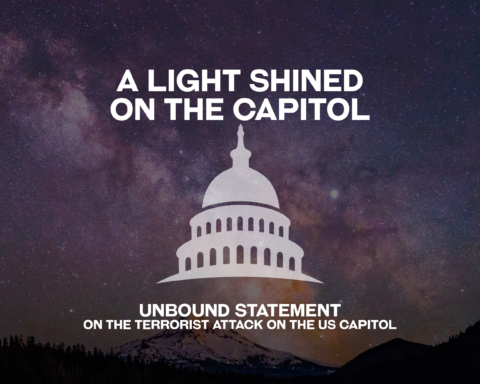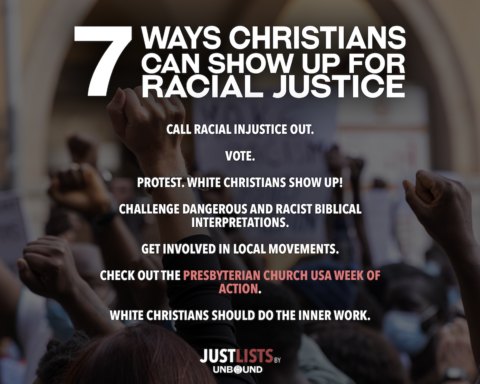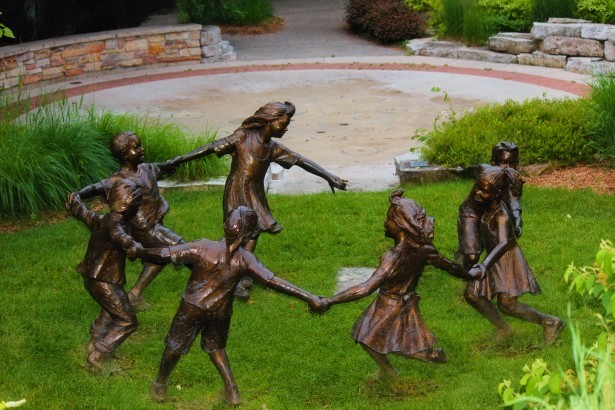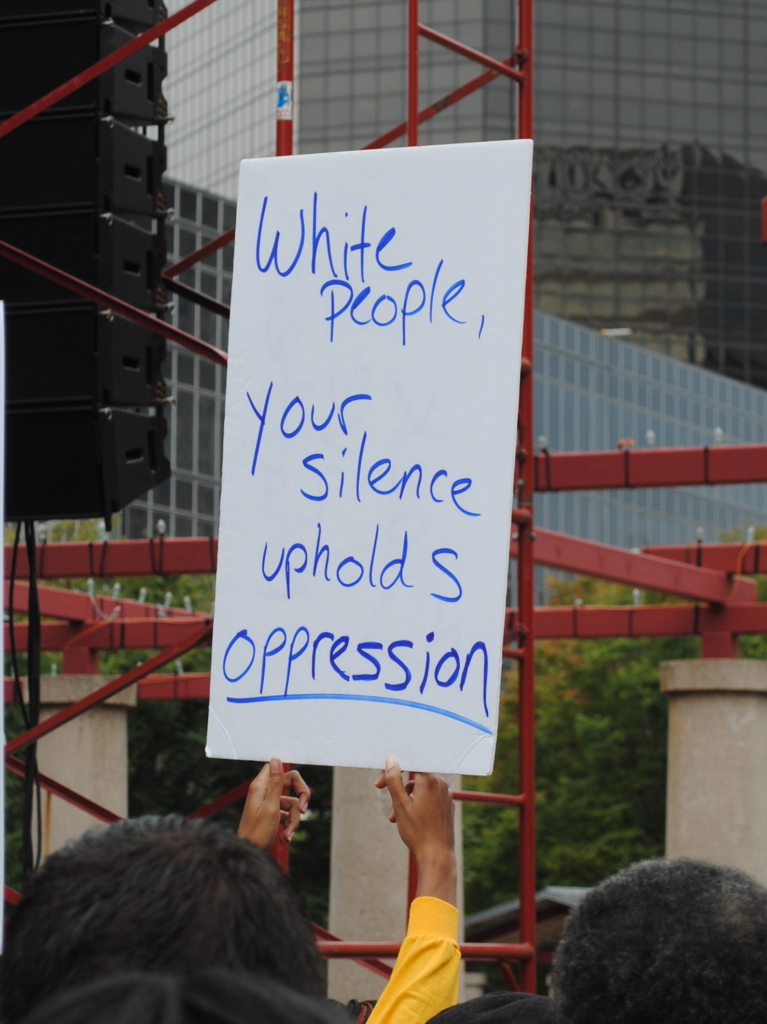In October 2014, a group from East Liberty Presbyterian Church, the Community of Reconciliation Church, and the Verona Presbyterian Church toured together the temporary “RACE” exhibit at the Carnegie Museum of Natural History in Pittsburgh. Following the tour, the group gathered for lunch and a moderated conversation led by the Presbyterian Mission Agency’s Associate for Gender & Racial Justice, Sera Chung. The following are reflections based on that experience

‘Providential’ was the word everybody kept using.
Two things happened simultaneously, and in retrospect they do seem to be guided by the hand of God. The members of the East Liberty Presbyterian Church in Pittsburgh sent out an invitation to neighboring congregations to participate together in a visit to the “RACE” exhibit at the Carnegie Museum of Natural History. At the same time, the members of the Verona Presbyterian Church, where I serve, sent out an invitation to Sera Chung, Associate for Gender & Racial Justice at the Presbyterian Mission Agency, to come and work with us for a weekend on our own issues around race and privilege.
The intent of the first was to foster fellowship among our congregations while learning together about the role of discrimination and privilege in our society. The intent of the second was to help our own small congregation address areas where we needed to grow and become more proactive when dealing with racial reconciliation. The ‘providential’ surprise was that these two initiatives, which started out independently, ended up taking place on the very same weekend. As a result, both congregations participated in the tour of the “RACE” exhibit (along with several others), and Sera Chung led a moderated conversation for everyone afterwards over lunch. Sera then stayed the next morning to help lead worship at the Verona Presbyterian Church and conduct a workshop with our Session. It truly did feel providential. God, it seems, was working behind the scenes to bring all these events about.
___________________________________________
Worship is intimate. A person has to really feel safe before he or she is able to open up before God. I believe this is one reason why it is so hard to cross cultural lines on Sunday morning.
___________________________________________
But for what purpose? As enjoyable and helpful as it was, I left the weekend wondering what God had been up to among us. Most of us learned something new during the experience. Those who felt that race is a major issue in our church and society today had those feelings confirmed. We came up with a few action items to carry forward. We committed to focusing our efforts and energies on reconciliation in the future. But what really changed? Why had God gone to such great lengths to arrange events for just such a time as this?
 In the Book of Revelation, chapter seven, we are given a vision of the great multitude that will one day gather before the throne of God. They are people, we are told, who come from “every nation, from all tribes and peoples and languages, standing before the throne and before the Lamb, robed in white, with palm branches in their hands” (Rev. 7:9). It’s a beautiful image, isn’t it? A sea of people coming together: colors, cultures, and languages intermingling into one great whole, waving palm branches before God.
In the Book of Revelation, chapter seven, we are given a vision of the great multitude that will one day gather before the throne of God. They are people, we are told, who come from “every nation, from all tribes and peoples and languages, standing before the throne and before the Lamb, robed in white, with palm branches in their hands” (Rev. 7:9). It’s a beautiful image, isn’t it? A sea of people coming together: colors, cultures, and languages intermingling into one great whole, waving palm branches before God.
I think that this vision is truly remarkable. Remarkable because it is a vision that includes people from every nation and tribe gathered together. And, remarkable because it is a vision that includes people from every nation and tribe gathered together in worship. Worshiping together across all racial lines and ethnicities. Compared with the present state of the church in our culture today, this is a miracle indeed.
It is often said that the most segregated hour of the week is on 11 AM Sunday morning, the time when churches traditionally gather to worship. According to Rice University sociologist Michael Emerson, most churches are 10 times more segregated than their surrounding neighborhoods, and 20 times more segregated than their nearby public schools. Instead of being a leader in the area of racial integration, the church in the United States is woefully behind the surrounding culture.
___________________________________________
So if it is so hard to overcome racial separation, if people naturally gravitate towards single-race churches, why disrupt that?
___________________________________________
In our own experience as a majority-white congregation at Verona Presbyterian Church, we have found that diversity is a tough area in which to make gains. In fact, sometimes there is a pull in the opposite direction, a desire to circle up and stick with people who are ‘like us’ because, quite frankly, it’s easier. It is difficult to break down long-established barriers, and we know that becoming truly cross-cultural will require real change. We know it involves much more than simply inviting people of color to come to our church so that we can call ourselves ‘racially diverse.’ No one wants to be used for someone else’s appearances. Surface level changes are not enough.
 Worship is intimate. A person has to really feel safe before he or she is able to open up before God. I believe this is one reason why it is so hard to cross cultural lines on Sunday morning. We spend so much of life putting up walls to keep the world out; worship is one place where we are supposed to be able to put down all our defenses and let our true selves come out before our Creator. Like a turtle venturing its head outside of its shell, we are lifting up our very spirits to God when we worship. Sometimes we laugh, often we cry, sometimes we really belt out a song, or shout hallelujah and amen, or lift up our hands in praise, and other times we sit in stillness. This can all be extremely vulnerable. I think that this is a big part of why many look for a place of refuge on Sunday morning, a place where they don’t have to experience racism as they do out in society, or walk through the minefield of racial tensions, wary of doing or saying the wrong thing. People want a racial time-out, so to speak.
Worship is intimate. A person has to really feel safe before he or she is able to open up before God. I believe this is one reason why it is so hard to cross cultural lines on Sunday morning. We spend so much of life putting up walls to keep the world out; worship is one place where we are supposed to be able to put down all our defenses and let our true selves come out before our Creator. Like a turtle venturing its head outside of its shell, we are lifting up our very spirits to God when we worship. Sometimes we laugh, often we cry, sometimes we really belt out a song, or shout hallelujah and amen, or lift up our hands in praise, and other times we sit in stillness. This can all be extremely vulnerable. I think that this is a big part of why many look for a place of refuge on Sunday morning, a place where they don’t have to experience racism as they do out in society, or walk through the minefield of racial tensions, wary of doing or saying the wrong thing. People want a racial time-out, so to speak.
So if it is so hard to overcome racial separation, if people naturally gravitate towards single-race churches, why bother? Why disrupt that? Can we still be Christian and not talk about race?
Perhaps. Or perhaps we desperately need to talk about race, and to keep talking about race, because we need to be saved. Not so that we can be more politically correct; not so that we can present ourselves as ‘racially diverse’ or more acceptable to other people, but because we ourselves need to be liberated from sin. Because a racially divided Church is a Church in need of salvation.
___________________________________________
We desperately need to talk about race, and to keep talking about race, because a racially divided Church is a Church in need of salvation.
___________________________________________
Racial divisions and class privilege stand in the way of our relationship with God. They obscure our ability to say with conviction that salvation belongs to God – and therefore not to our social standing, respectability, or privilege. We need to get saved. And we need a savior to do it. To strip us down to our position of basic need so that we can encounter one another once again as actual human beings. Human beings placed in community together. To accept anything less is to reject the community of Christ.

Of course, such a vision will not be achieved overnight. The consequences of sin and centuries of institutionalized white supremacy will not be dismantled quickly or easily. But my mind wanders back to that word, ‘providential’. If it is true that God was so clearly at work arranging schedules and bringing people together for something so simple as our weekend events, then who is to say that God is not doing the same thing behind the scenes all over the Church? Perhaps this is the Spirit moving wherever there is willingness and receptiveness to growth. I wonder if our one event isn’t part of a larger movement of God’s providence to bring to fruition the vision of all God’s people worshiping together across racial boundaries. More than anything, the thought of God at work in these small and grand ways is what gives me hope for the future – and hope for myself.
Yes, the work is hard and the road is long. But perhaps these holy moments like churches getting together to learn, or a small congregation confronting its own legacy of separation, or hard conversations led by denominational staff in local congregations, are like seeds being planted. Seeds that will one day grow into trees, whose trunks will one day sprout long, leafy branches – the very branches that will one day be held in the hands of that victorious and remarkable multitude in heaven. And God willing, we will be among them – all of us – robed in glory, waving green palm branches, and singing praise to God.
*****
AUTHOR BIO: Rev. Brian Diebold lives with his family in Pittsburgh, Pennsylvania. He is the pastor of the Verona Presbyterian Church, where he has served for the past six years, and is a graduate of the Pittsburgh Theological Seminary.
Read more articles in this issue Call to Confession: Race, White Privilege and the Church!






Unbound Social